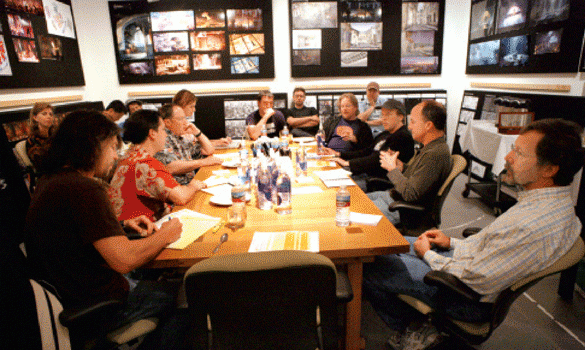The COO of Hightail.com takes a look at why projects fail, and in doing so gives all of us insights into stumbling blocks we all might encounter along the way as new projects are undertaken. It all comes down to management, control, budgeting, focus and execution. Learn more from this fun article and what risks we take by not being focused on the projects we launch.
Five reasons why projects fail

An amended version of this article was originally published in Entrepreneur.
As a founder of multiple startups and current COO of Hightail, I’ve led many projects, from launching new websites to rebranding a multi-billion dollar global company. While I’ve had some great wins, I don’t mind admitting that there have also been a few disasters.
A runaway success often seems like the result of some arcane alchemy, but in my experience failure is rooted in the same recurring problems. I’m going to highlight five of these mistakes and the lessons I’ve learned about avoiding them in future projects.
1. Eyes are bigger than your budget
We’d all love to run a Super Bowl ad but you can’t do it on a shoestring. Businesses need goals, even dreams. You just have to temper them with a healthy dose of reality and expectation setting, so that it’s clear what you can actually achieve given your available time, resources and budget.
Recognizing your constraints can lead to unexpected benefits. When the founders of 37 Signals began work on their signature product, Basecamp, they made an honest assessment of how much time each person could invest. As most of the founders still had full-time jobs, their time constraints forced them to develop a feature-lite project management tool. This simplicity turned out to be one of the major factors behind the success of the app.
To avoid misaligning dreams with reality, your business needs a culture of honest communication that encourages clear-sighted discussion across all levels instead of just having unquestioned orders flow downstream.
2. Working with the wrong talent
Whatever the project, a company’s first instinct is to put an in-house team on it. After all, that’s what they’re there for, right? But just because someone is part of your company doesn’t mean they’re the right person for a specific project.
I used to run a startup that made games and 3D animations. We had a full-time staff member whose job was solely to find external talent. If we needed CG lighting, he’d call a Kuala Lumpur-based animator because he was the best lighting guy we knew. Our aim was always to find the right person for a project and not just who was available in-house.
The key is to be honest with yourself and your employees and, if necessary, look outside your core team to find the best people for a project. Start building relationships now with agencies, contractors and consultants so you have a network ready to fulfill specialized tasks when the time comes.
3. Continuing to pursue bad ideas
In Hollywood, they say it’s easy to make a bad film from a good script but impossible to make a good film from a bad script. Though you won’t always recognize a bad idea straight away, once you do, never assume that you’ll make it work or believe that you’ve put in too much effort to change course.
I once worked with an external agency on a series of digital ads but after a number of designs, tweaks and iterations, I still couldn’t convince myself that we’d hit gold. Eventually I realized that the visual approach we had agreed upon at the beginning of the project was wrong. After we decided to start over and work with a new set of stylistic references, the project came together very quickly.
The minute you recognize that an idea won’t work, you have to pull the plug. It’s usually impossible to retrieve a bad idea and you’ll only waste time, money and energy trying to put lipstick on a pig.
4. Death by committee
A project often has multiple parties interested in its outcome and groups may even have divergent goals and expectations. I once spent weeks working with a designer and copywriter on a website home page redesign, only to have our carefully-crafted work dismantled by the company’s various heads of department demanding changes to meet their individual needs. Our problem was that we failed to establish who owned the project and therefore didn’t deal with potential conflicts and disappointments in advance.
Renowned animation studio Pixar has a large group of people it calls the “brain trust” that meets to review films at different stages of production. Though the committee’s job is to provide notes on potential problems and offer solutions, none of the advice is mandatory. The film’s director retains complete control over the final product.
 Feedback is an essential stage of any project. But decision-by-committee rarely leads to best outcome. Every project should start by establishing clear, workable goals and give one person the ultimate ownership and accountability for meeting them.
Feedback is an essential stage of any project. But decision-by-committee rarely leads to best outcome. Every project should start by establishing clear, workable goals and give one person the ultimate ownership and accountability for meeting them.
5. Keeping the final approver in the dark
Typically the bulk of work on a project happens below the level of the final approver. You often get a situation where, for example, a freelancer works closely with their contact at a company to complete a piece of work, only to hear the dreaded words: “now I just have to run this past my boss”. I call this “the contractor’s nightmare”.
As someone who is often the “boss”, I find it remarkable if the first thing I see is the “final” version and I’m just expected to give it a thumbs-up. In reality, my first experience of a project is likely to produce lots of questions, comments and suggestions. While I don’t believe in micromanaging talented people, being able to review a project at certain set stages makes for a better overall process. I’d much rather give feedback on a plan sketched out in a day than reject weeks of hard work if it’s not good enough.
When beginning a project, establish clear checkpoints for the ultimate approver to provide feedback. This will help ensure a smoother path to the finish line.
These are the five most common causes of why projects fail. Applying these suggested pre-emptive strikes and remedies should help you avoid catastrophe on your next big project. If you have solutions to other common project mistakes, I’d love to hear them in the comments.


Great website. Lots of helpful information here. I’m sending it to several pals ans also sharing in delicious.
And naturally, thank you on your effort!